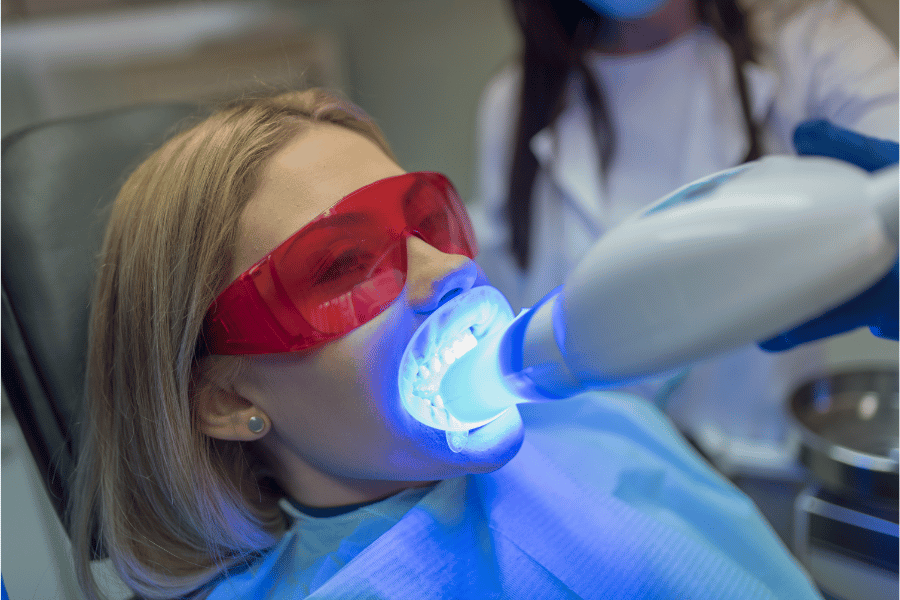
Table of contents
Introduction:
A bright, radiant smile can enhance your overall appearance and boost your confidence. Many people strive for a whiter smile, which has led to the popularity of teeth whitening treatments. While teeth whitening can effectively remove stains and discoloration, it's essential to prioritize the long-term health and strength of your teeth.
Understanding Enamel: The Guardian of Your Teeth
Before delving into teeth whitening techniques and enamel protection, it's crucial to understand the role of enamel in maintaining dental health. Enamel is the outermost layer of your teeth, and it serves as a protective shield against decay and sensitivity. Its strength, however, doesn't make it invincible.
What Causes Enamel Erosion?
Enamel can gradually wear away due to various factors, such as:
- Acidic foods and drinks
- Poor oral hygiene
- Teeth grinding
- Acid reflux
- Dry mouth
- Genetics
Loss of enamel can give rise to tooth sensitivity, discoloration, and the increased likelihood of tooth decay. It's important to protect your enamel to maintain the strength and health of your teeth.
Teeth Whitening: Balancing Aesthetics and Dental Health
Teeth whitening treatments aim to lighten the shade of your teeth by removing stains and discoloration. While these treatments can enhance the aesthetic appeal of your smile, it's important to approach teeth whitening with caution to preserve the strength of your teeth
Some teeth whitening products can be harsh on your enamel, causing erosion and sensitivity. That's why it's essential to choose a teeth whitening product that is enamel-safe.Enamel-safe teeth whitening products use ingredients that are gentle on your enamel. They can help remove surface stains without damaging your teeth. It's also important to follow the guidelines closely and not overuse teeth whitening products. Overusing teeth whitening products can lead to enamel erosion and tooth sensitivity.
Preserving Enamel: Key Practices for Strong Teeth
Beyond teeth whitening, incorporating the following practices into your dental routine will help protect and preserve your enamel:
Maintain Good Oral Hygiene:Make it a habit to brush your teeth at least twice daily, employing a soft-bristled toothbrush. Gentle, circular motions are more effective and less likely to cause enamel erosion.
Avoid Acidic Foods and Drinks:Acidic foods and beverages, such as citrus fruits, sodas, and sports drinks, can erode enamel over time. When consuming these items, it's best to moderate your intake and follow up with a thorough water rinse to counteract the acidic properties.
Moderate Consumption of Staining SubstancesFoods and beverages like coffee, tea, red wine, and berries can stain your teeth. While it's not necessary to eliminate them from your diet completely, try to consume them in moderation. Additionally, using a straw when drinking staining substances can help minimize contact with your teeth.
Don't Smoke:Smoking not only stains your teeth but also contributes to gum disease and oral cancer. Quitting smoking is crucial for both your oral and overall health.
Regular Dental Check-ups:Schedule regular dental check-ups every six months. Dentists can detect early signs of enamel erosion, offer professional cleaning, and provide guidance on maintaining good oral health.
Conclusion
To sum up, our teeth play a vital role in our overall health and should be given the care they deserve. While teeth whitening can enhance the appearance of your teeth, protecting your enamel is crucial to maintaining their strength and longevity. Understanding the significance of enamel protection and adopting proper dental care practices will help you maintain a healthy smile for years to come. Bear in mind that a cheerful smile is a reflection of a well-maintained and healthy mouth!
FAQs
What is enamel of the tooth?
A tooth's enamel is its thin outer covering. It acts as a barrier between the tooth and the external forces which would otherwise be harmful to the vital tissue in the underlying dental pulp.
Are all teeth whitening products harmful for the teeth?
No, most of them are safe when used as directed. When opting for a teeth whitening kit, consult your dentist or choose the one with a gentle formula.